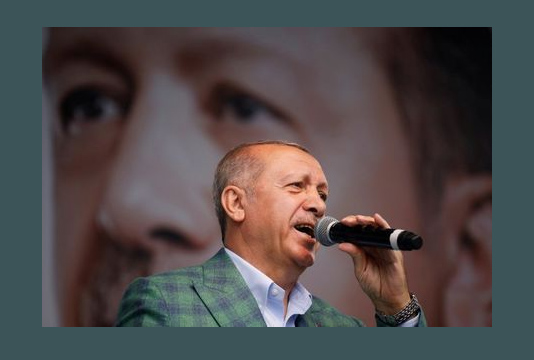ISTANBUL, June 24, 2018 (BSS/AFP) – Turks were voting Sunday in dual
parliamentary and presidential polls seen as President Recep Tayyip Erdogan’s
toughest election test, with the opposition revitalised and his popularity at
risk from growing economic troubles.
Over 56 million eligible voters were for the first time casting ballots in
both elections, with Erdogan looking for a first round knockout and an
overall majority for his ruling Justice and Development Party (AKP) to extend
his 15 year grip on power.
But both these goals are in doubt in the face of an energetic campaign by
the secular Republican People’s Party (CHP) candidate Muharrem Ince, who has
rivalled Erdogan’s charisma and crowd-pulling on the campaign trail, and a
strong opposition alliance in the legislative polls.
“I hope for the best for our nation,” said Ince as he cast his ballot in
his native port town of Yalova south of Istanbul, vowing to spend the night
at the headquarters of Turkey’s election authority in Ankara to ensure a fair
count.
Voting in Istanbul along with his son-in-law and Energy Minister Berat
Albayrak, Erdogan said he expected turnout to be strong in an indication of
“how mature democracy is in Turkey.”
The CHP said it had recorded violations in particular in the southeastern
province of Sanliurfa. But Erdogan insisted there was no major problem. In a
later tweet, Ince vowed to protect every vote “with my life.”
– ‘Far tighter than expected’ –
Erdogan has overseen historic change in Turkey since his Islamic-rooted
ruling party first came to power in 2002 after years of secular domination.
But critics accuse the Turkish strongman, 64, of trampling on civil liberties
and displaying autocratic behaviour.
He remains the favourite to hold on to the presidency — even if he needs
a second round on July 8 — but the outcome is likely to be much tighter than
he expected when calling the snap polls one-and-a-half years ahead of
schedule.
Although Erdogan dominated airtime on a pliant mainstream media, Ince
finished his campaign with eye-catching mass rallies, including a mega
meeting in Istanbul on Saturday attended by hundreds of thousands.
“Even if the odds are on the incumbent’s side, the race is likely to be
far tighter than many expected,” said Ilke Toygur, analyst at the Elcano
Royal Institute and adjunct professor at University Carlos III in Madrid.
The stakes in this election are particularly high as the new president
will be the first to enjoy enhanced powers under a new constitution agreed in
an April 2017 referendum strongly backed by Erdogan.
As he cast his vote, Erdogan said the changes marked a “democratic
revolution”, although his opponents regard the most recent phase of his rule
differently.
The president had for the last two years ruled under a state of emergency
imposed in the wake of the 2016 failed coup, with tens of thousands arrested
in an unprecedented crackdown which cranked up tensions with the West.
Erdogan, whose mastery of political rhetoric is acknowledged even by
critics, has won a dozen elections but is now fighting against the backdrop
of increasing economic woes.
Inflation has zoomed well into double digits — with popular concern over
sharp rises in staples like potatoes and onions — while the Turkish lira has
lost some 25 percent in value against the US dollar this year.
“At each election, I come with hope. But this year I have a lot more
faith, but we’ll see,” said voter Hulya Ozdemiral as she cast her ballot in
Istanbul.
– ‘For Turkey’s future’ –
The votes of Turkey’s Kurdish minority will be especially crucial in the
parliamentary poll. If the pro-Kurdish Peoples’ Democratic Party (HDP) wins
seats by polling over the 10 percent minimum threshold, the AKP will struggle
to keep its overall majority.
But in a situation labelled as blatant unfairness by activists, the HDP’s
presidential candidate Selahattin Demirtas has campaigned from a prison cell
after his November 2016 arrest on charges of links to outlawed Kurdish
militants.
After casting his ballot in his jail in the northwestern region of Edirne,
Demirtas wrote on Twitter: “I wish that everyone uses their vote for the sake
of the future and democracy of the country.”
Voting already closed last week for Turkish citizens resident abroad, with
just under 1.5 million out of just over 3 million registered voters casting
their ballot, a turnout of just under 49 percent.
High security is in place across the country, with 38,480 police officers
on duty in Istanbul alone. As is customary in Turkey on polling days, sales
of alcohol in shops are also prohibited.
Polling stations were due to close at 1400 GMT, with the first results
expected late in the evening.



